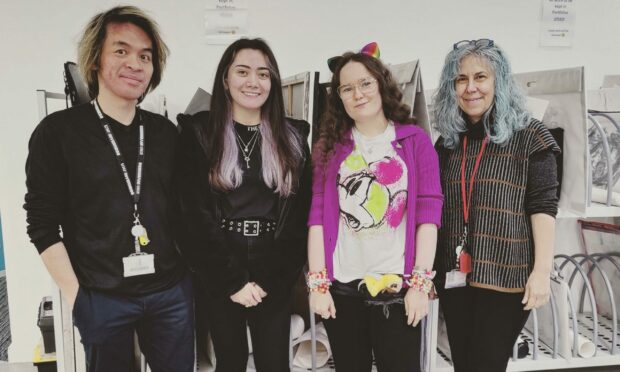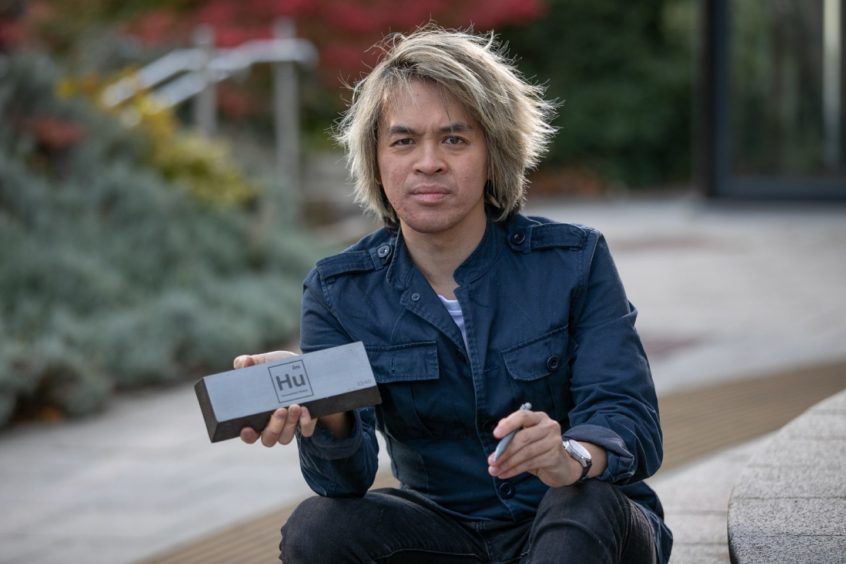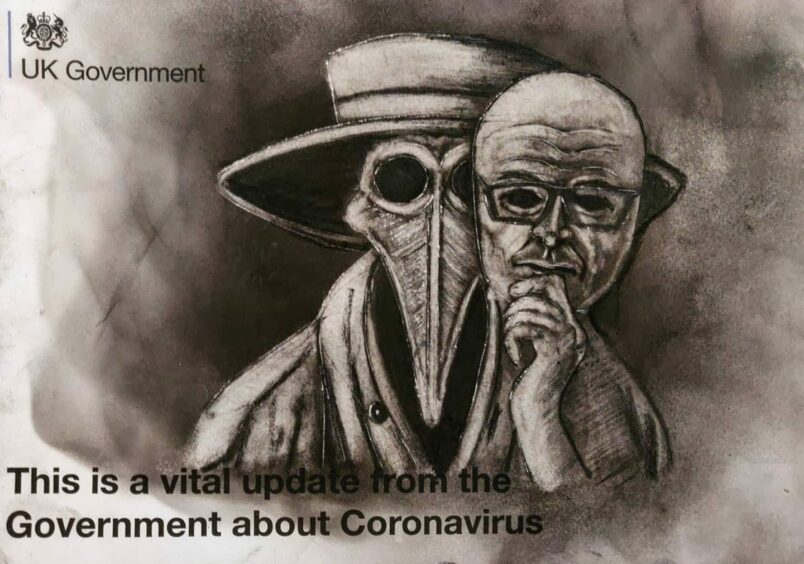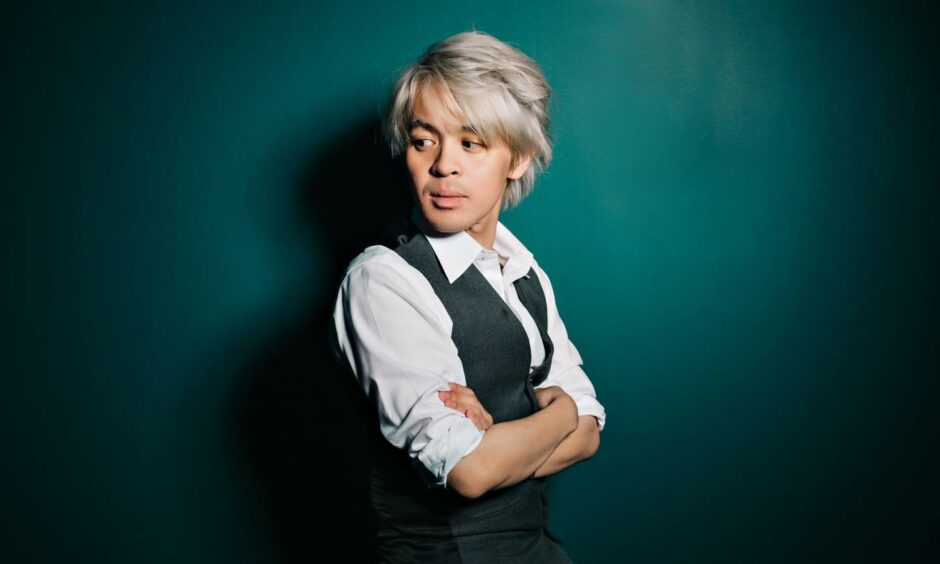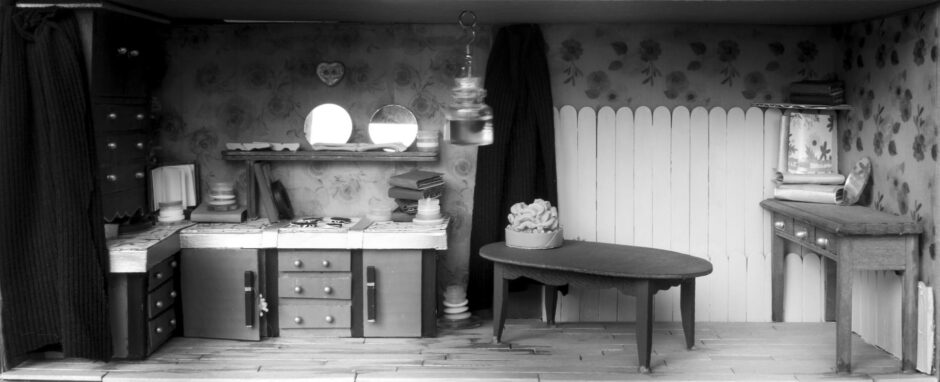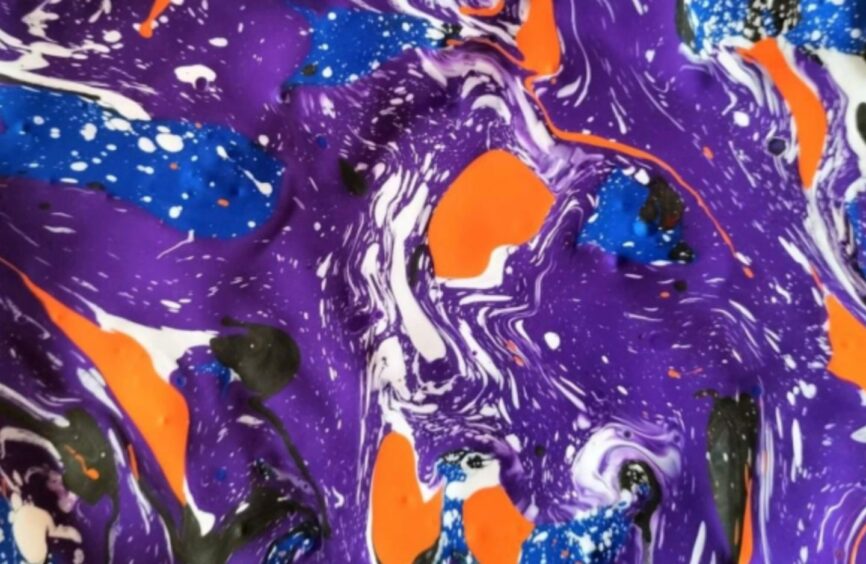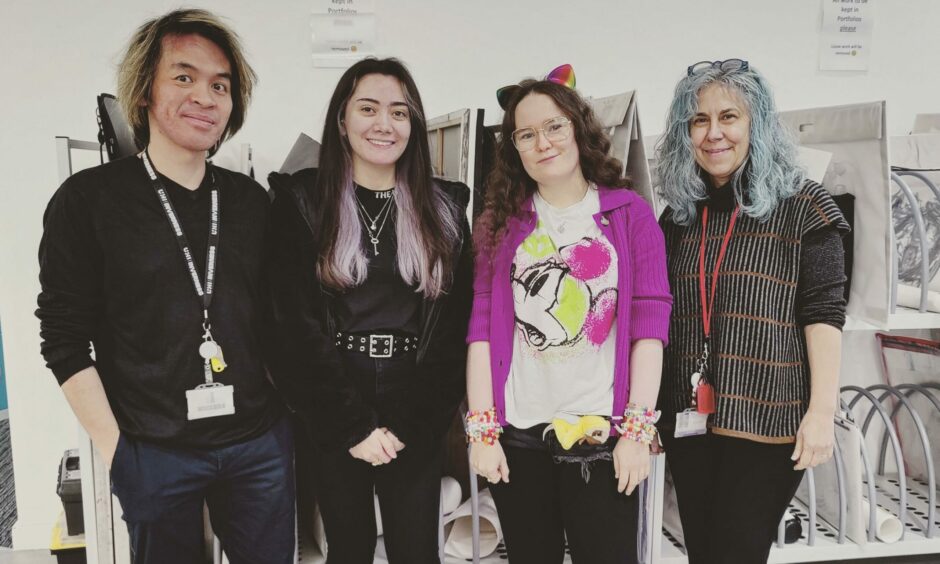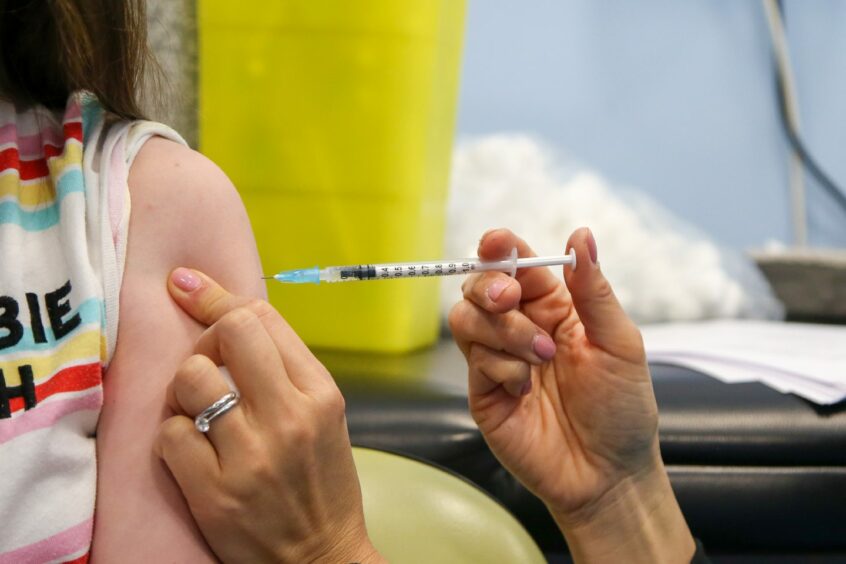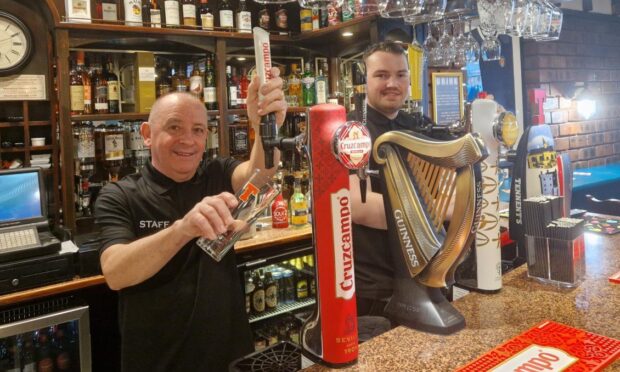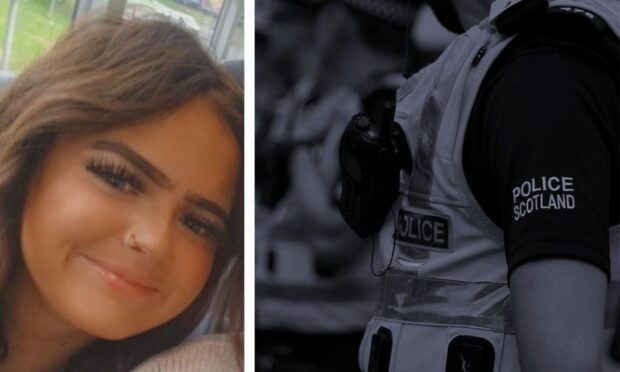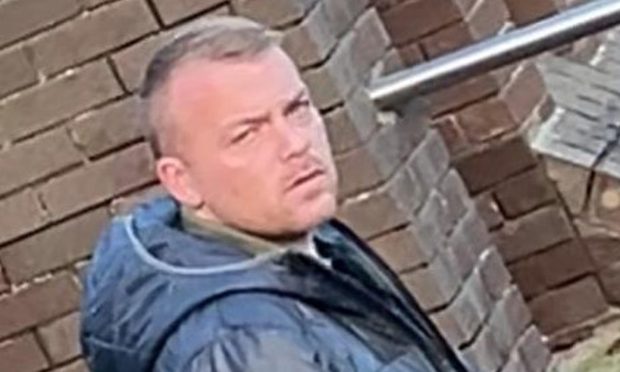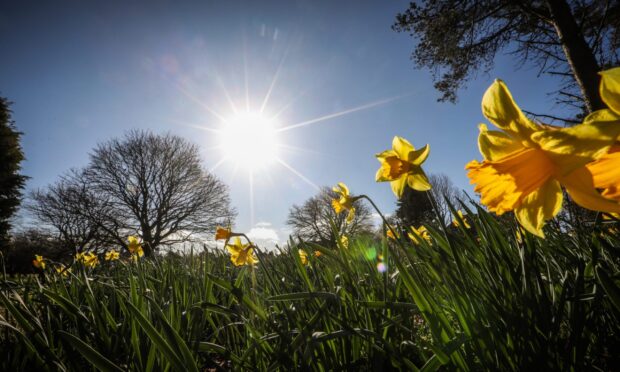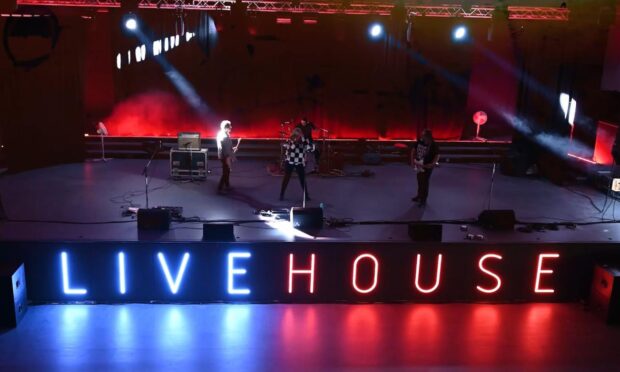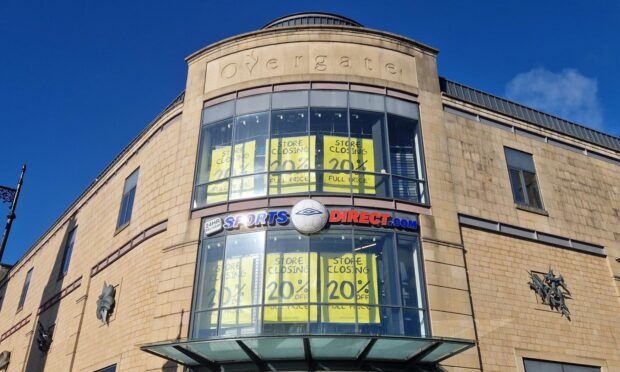Award-winning Dundee trained artist Frank To already had a big reputation before the Covid-19 pandemic.
The internationally-renowned Huddersfield University and Duncan of Jordanstone College of Art and Design graduate had exhibited alongside some of the greats of the international art scene, including Banksy, Jimmy Choo and Antony Gormley.
His work was owned by famous collectors including Sir Patrick Stewart, the celebrated Star Trek actor, and Deloitte.
When the first lockdown came in 2020, previous work he’d done on 17th century ‘plague doctors’ inspired him to produce politically charged Covid-19 themed art which used soot and smoke to take a stance on the UK Government’s response to the pandemic.
Gunpowder techniques
Already renowned for using a unique gunpowder technique in his work, he announced he was embarking upon a project to help combat global gun violence.
Through a collaboration with IM Swedish Development Partner and Stockholm-based sustainable and social impact start-up A Good Company, he took possession of a special limited edition pen made from humanium metal – an alloy made from illegal firearms – which aimed to highlight how creativity can be used to promote world peace.
Other pandemic-busting accolades came last year when his work was accepted to the prestigious Royal Ulster Academy in Belfast, just months after selling out in the Society of Graphic Fine Art at Mall Galleries in London.
He also scored a prestigious London double this spring when his gunpowder art pieces were accepted to the sold-out Royal Society of British Artists’ annual exhibition at the Mall Galleries.
He was also represented at this year’s Affordable Art Fair in Battersea Park and, from May 17 to May 21, will feature in another exhibition at the Mall Galleries.
Away from his own artistic creations, however, the 40 year-old, who works as an art lecturer with the University of the Highlands and Islands (UHI) in Inverness, has been working with another Dundee graduate to help deal with the challenges facing art students – and lecturers – during the pandemic.
History in the Highlands
History was made in February when the Highlands’ first creative hub opened its doors to the north of Scotland’s cultural and business communities following a four year, £6m conversion of two historically significant properties.
Inverness Creative Academy is Wasps’ city-based complex that provides working accommodation for visual and applied artists as well as office space for the creative industries, social enterprise and charity sectors.
Managed by Wasps, the project has revived the redundant former Inverness Royal Academy buildings on Midmills Road in the heart of the city, and over the past four years has sensitively restored the Grade B listed Victorian properties whilst simultaneously giving a new life as a centre for creative practice, exhibition and collaboration.
However, the impact of the pandemic means that just two final year students on UHI’s BA (Hons) Art & Contemporary Practices course will graduate this year.
According to Frank, who lectures on the course alongside fellow Dundee graduate and course leader Rachel Fermi, the story is one of perseverance.
“This year group was seriously affected by the Covid-19 pandemic and lockdown,” says Frank.
“Students suffered from pressures and isolation from learning remotely.
“But this year group with its remaining students have managed to pull through.
“They have been mainly been taught by myself and my colleague Rachel of which we are both alumni and graduates from the University of Dundee.
“We are proud to have been able to lead the new generation of Scottish artists who have managed to operate. But it’s also interesting to understand the students’ perspectives of being taught through a major global pandemic.”
Adapting to Covid-19
Frank explained that UHI, which incorporates Perth College, already had a remote teaching programme in place before the pandemic hit.
The BA (Hons) Art & Contemporary Practices course progresses from HNC and HND in Contemporary Art Practice to degree level.
When Frank was teaching the HNC, he had 12 students on the course, all expecting to progress.
When Covid-19 hit, however, there was a “dramatic effect” on the year group with all but two dropping out – or at least deferring their progression – due to personal and practical reasons.
“The main issues were the social aspects and the uncertainties of the pandemic,” says Frank.
“When the first lockdown happened, most people thought it was quite a novelty to stay at home during the spring months.
“But as it progressed it became quite draining, particularly with this being a practical course.
“That being said, even though the pandemic did have an impact on the welfare of students and numbers, there were positive things that came out of it.
“We were quite high on student experience and lecturers went well beyond the call of duty to make sure students were not disadvantaged as such during the pandemic.”
Frank said the “beauty of UHI” is it also does college courses from NC level four and five.
They included the two students – Isla Jacobs and Jemima Macdonald – who are graduating this May, meaning that they have actually been with UHI for seven years.
Isla, of Nairn, has been working to create dollhouses and figures in response to the uncanny.
Using her preferred method of ink and graphite as well as traditional and digital art, her practice is based upon collecting, creating and observing, including insects.
Meanwhile, Jemima, of Inverness, has been working on a series of images that reach out to peoples’ mental health and anxiety issues.
The efforts have caught the attention of UHI principal Chris O’Neill who says: “I am always impressed by our students and the resilience and determination they continually demonstrate in their studies, regardless of the subject being studied.
“I’ve long felt that our collective futures will be in good hands.”
Challenges for lecturers and students
Rachel Fermi has been teaching at UHI since 2014 and has been the course’s Inverness-based programme leader for two years.
An MSA graduate from the Tyler School of Art in the USA and the holder of an undergraduate degree in photography from the University of Derby, she did her one year teaching qualification through the University of Dundee.
With the course she helps run split between Inverness and Perth colleges, she says it’s an “unusual degree” in so far as it’s a “bolt on” to the HND in contemporary art practice.
When it came to the practical problems of Covid-19, however, the main issues were trying to teach online something that’s very much based on physical experience.
“What worked really well I have to say is our students at UHI have a variety of backgrounds,” she says.
“They are spread across a wide area. So being online actually helped gel the group together because they were able to set up their own art studios at home.
“In some ways they were more productive during lockdown than they might have been having to travel back and forth between college and home.
“That was one of the real positives about it and certainly Isla and Jemima have been incredibly productive. Their graduating work really reflects that.”
Balancing act
Rachel says there’s no doubt everyone struggled with balancing personal life, school and work during the pandemic.
Thinking back to the imposition of lockdown on March 23, 2020, everything moved online “on a dime”.
Only five students graduated from the course at Inverness last year, and just two this year.
Last year there was an online degree show, and the year before that, students only presented online amongst themselves.
For lecturers, however, teaching online was also an issue.
“I think one of the big challenges of teaching online was students’ reluctance to switch cameras on,” says Rachel.
“A lot of the time it was like talking to ‘grey squares’.
“I think for me that was kind of the biggest challenge. You know people are there but you’ve not got that eye contact you normally have in an in-person class.”
Moving forward
With the 2022 event becoming in-person again, and a much larger year group of students expected next session, the degree course organisers will be looking to continue with the “best parts” of online technology to get the best of both worlds.
“Because our students are somewhat dispersed already and because UHI is made up of 13 partner colleges, we were already used to the challenges of remote delivery,” adds Rachel.
“We already had in place a lot of the technology that we needed in order to do that.
“However, certainly for certain types of subjects, there’s also advantages to being able to bring people together online without physically having to.
“Sometimes it’s easier to meet up together virtually without the issues of travel or the time it takes to travel. Moving forward we are trying to pick the best of those things.”
The UHI degree show runs from May 13 to May 19 at the WASPS Creative Academy in Inverness.
